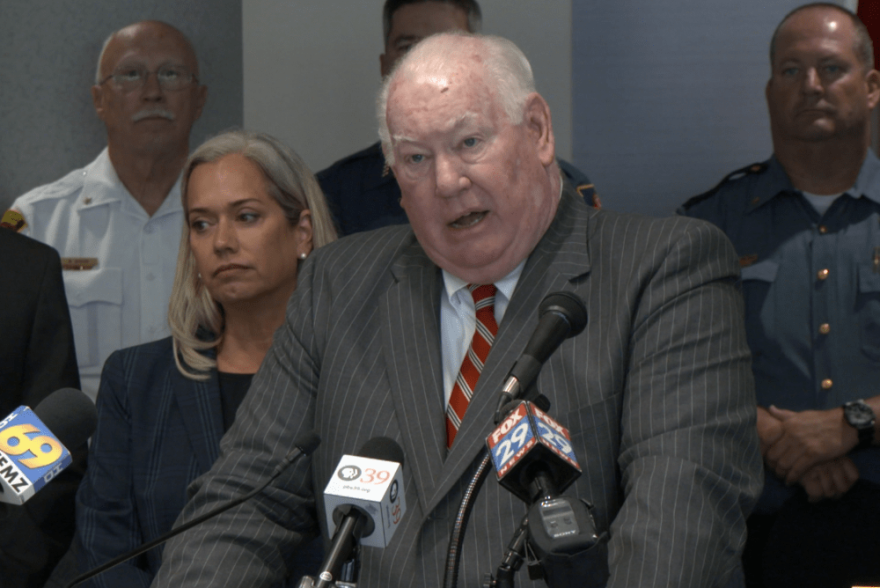
ALLENTOWN, Pa. - Brianna Aletras-Dunn is a recovery specialist working to help those suffering from addiction. Originally from Fredericksburg, Va., she moved to the region about three years ago.
But other people’s demons aren’t what brought her here. It was her own.
“As a whole, Lehigh County has a lot of help, more so than other places that I’ve seen,” Aletras-Dunn said in a recent interview. “When I came here, this county had more help than I’ve ever seen in my whole life.”
She said she found programs in the region to help her overcome an ongoing addiction to, primarily, Xanax, alcohol and cocaine.
Soon, Lehigh County could have even more support for those struggling with addiction.
One big beneficiary could be the county’s Blue Guardian program, which steps in after someone has been revived by Narcan, a lifesaving medication given to those suffering a drug overdose.
The county recently received $1 million in state funding, secured by state Sen. Pat Browne (R-Lehigh), earmarked for causes intended to help fight opioid addiction. The money comes from the county’s share of a $1 billion national settlement against opioid manufacturers.
Lehigh County District Attorney Jim Martin said that’s not the only money. He expects more to come down the line -- though he didn’t detail the specific number -- as his office filed a separate opioid lawsuit under the consumer protection law.
Martin said there's a number of ways he would like to spend the funding.
“It’s a rather broad definition of what we can use it for,” Martin said. “It’s sort of up in the air right now.”
Martin, whose office will have final say on where this funding is used, said it could be spread out through a number of programs.
He said a share of the funds could afford treatment for those without insurance, or could be used to support the county’s Team MISA program - which stands for Mental Instability and Substance Abuse.
But he noted that he specifically wants to expand the Blue Guardian program.
In the program, days after someone is revived from an overdose, members of the police, along with a trained recovery specialist, will visit the individual’s home and family.
Aletras-Dunn is one of the specialists from the local recovery center, Treatment Trends, who visits homes as part of Blue Guardian.
“It’s very beneficial for us to work with the police department,” Aletras-Dunn said. “This is bridging the gap between somebody who is using substances and the police, because there’s a huge stigma there.
“I‘m in long-term recovery myself. So having somebody like myself going out with a police officer to talk to somebody who has just experienced an overdose, they see somebody who has been on their side of things working hand-in-hand with the police department to go out and help people.”
But it’s not just the individual.
Aletras-Dunn said the real impact of Blue Guardian is that it lets her engage the family of someone who has experienced an overdose. She said it enables her to help mend fences in households and help people get the support they need -- not just from treatment, but from their loved ones, as well.
“Addiction is a family disease,” she said. “Addiction affects the entire family; it does not just affect the individual. So if we can connect with more than just the individual, I find that simply amazing.”
She said she has “had family members who were ready to throw in the towel on their children, but by me showing up at their door, they were ready to hear about our programs and what we have to offer.”
Martin said that since Blue Guardian was launched in 2018, it’s helped about 75 people to agree to go into treatment. And he said the program could be even more successful if it’s expanded.
“It’s not a big number, but any number is significant in terms of helping out,” Martin said. “And, what we’ve run into, most of these cases are in the city of Allentown. And, what we’ve found over the years is people are coming into the city, people are OD’ing here, they are being revived here, but they don’t live here.
“And, in fact, they don’t even live in Lehigh County. So, if somebody does that here and they are from Northampton County, Berks County, Bucks or Carbon, we can’t send a police officer into those jurisdictions to do what we do locally.”
Julia Kocis, director of Lehigh County’s Regional Intelligence and Investigation Center -- which runs Blue Guardian along with Martin’s office -- said her office tracks county overdose deaths.
Her office found that, from 2015 to 2021, there have been at least 1,148 overdose deaths in Lehigh County. She said the Blue Guardian program could do more, but it’s hampered by the fact that many who overdose come into the county from other places.
“Additional funding toward treatment and program expansion could greatly help us coordinate efforts across geopolitical boundaries to get more people into treatment,” she said in an email to WLVR.
For Aletras-Dunn, who works closely with families and those impacted by opioid addiction, continued support of what is working -- such as Blue Guardian -- might be the best way to use this funding.
“As far as the programs as a whole in the county, I think that there’s so much help available,” she said. “It’s just feeding into the programs that are there to give all of us more resources to help more people. I think that’s what it comes down to.”
Sign up for our WLVR weekly newsletter to stay up to date with the latest news from the Lehigh Valley and across Pennsylvania.


